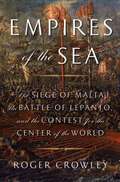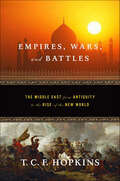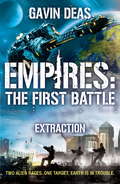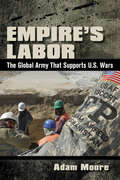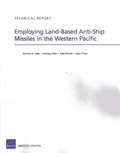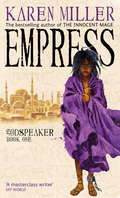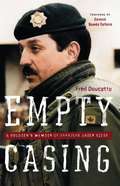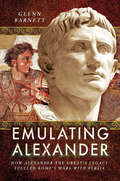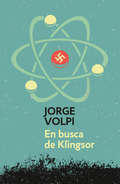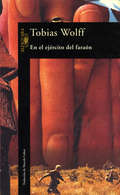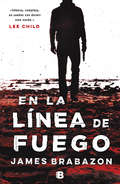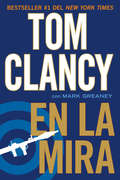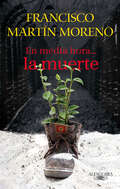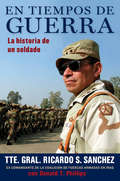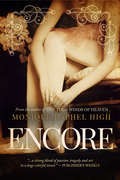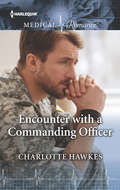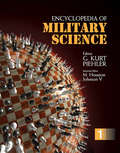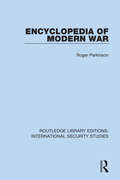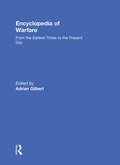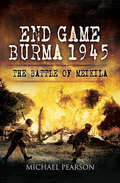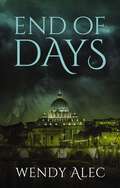- Table View
- List View
Empires of the Sea: The Siege of Malta, the Battle of Lepanto, and the Contest for the Center of the World
by Roger CrowleyIn 1521, Suleiman the Magnificent, Muslim ruler of the Ottoman Empire at the height of its power, dispatched an invasion fleet to the Christian island of Rhodes. This would prove to be the opening shot in an epic struggle between rival empires and faiths for control of the Mediterranean and the center of the world.In Empires of the Sea, acclaimed historian Roger Crowley has written his most mesmerizing work to date-a thrilling account of this brutal decades-long battle between Christendom and Islam for the soul of Europe, a fast-paced tale of spiraling intensity that ranges from Istanbul to the Gates of Gibraltar and features a cast of extraordinary characters: Barbarossa, "The King of Evil," the pirate who terrified Europe; the risk-taking Emperor Charles V; the Knights of St. John, the last crusading order after the passing of the Templars; the messianic Pope Pius V; and the brilliant Christian admiral Don Juan of Austria. This struggle's brutal climax came between 1565 and 1571, seven years that witnessed a fight to the finish decided in a series of bloody set pieces: the epic siege of Malta, in which a tiny band of Christian defenders defied the might of the Ottoman army; the savage battle for Cyprus; and the apocalyptic last-ditch defense of southern Europe at Lepanto-one of the single most shocking days in world history. At the close of this cataclysmic naval encounter, the carnage was so great that the victors could barely sail away "because of the countless corpses floating in the sea." Lepanto fixed the frontiers of the Mediterranean world that we know today.Roger Crowley conjures up a wild cast of pirates, crusaders, and religious warriors struggling for supremacy and survival in a tale of slavery and galley warfare, desperate bravery and utter brutality, technology and Inca gold. Empires of the Sea is page-turning narrative history at its best-a story of extraordinary color and incident, rich in detail, full of surprises, and backed by a wealth of eyewitness accounts. It provides a crucial context for our own clash of civilizations.
Empires, Wars, and Battles: The Middle East from Antiquity to the Rise of the New World
by T.C.F. HopkinsA modern Herodotus looks at war in the ancient Middle East, Empires, Wars, and Battles is a brilliantly readable popular history from T.C.F. Hopkins.As current events have made painfully obvious, the Middle East is a region long torn by strife and traditions of warfare. In this elegant, fast-paced, and well thought out cultural and military history, T. C. F. Hopkins, author of Confrontation at Lepanto, provides a remarkable glimpse into the origins of the conflicts that formed the ancient world as well as the world we have inherited.This book examines the development of the traditions and hostilities that have grown from millennia of conflict and looks at the precarious balance between the West and the Middle East. Focusing on complex rivalries, from the Ancient Egyptians and Hittites to the five-hundred-year conflict between the Ottoman and Byzantine Empires, this book seeks to shed light on the character of the region, and why it has borne and continues to bear a critical role in world affairs. Incorporating the most recent discoveries and scholarship, Empires, Wars, and Battles provides both an account of political and military events and a survey of the cultures and societies of the ancient Near East.The straightforward, accessible text is clear and credible to the well-read history buff, but understandable and fascinating to the reader who knows nothing about ancient or military history. There are few books that can claim to cover this complex, timely material in such a comprehensive and interesting fashion.At the Publisher's request, this title is being sold without Digital Rights Management Software (DRM) applied.
Empires: The First Battle
by Gavin DeasTwo alien invasions. Two heroes. One Story. Collects EMPIRES: EXTRACTION and EMPIRES: INFILTRATION in one volume!This groundbreaking collaboration between two Gollancz authors tells of the invasion of Earth by two different alien races - at the same time. Two men become aware of the threat, and must work to sabotage the invasion plans and see off the aliens.Each book follows one hero, uncovering the threat to humanity and the world from their point of view. Each book can be read on its own, and will give the reader a complete, kinetic, fast-paced military SF story. But read both books and the reader gets something else - another view of (some of) the same events and crossover points, culminating in a bloody battle at Canary Wharf.The two books can be read in any order, but together they tell the story of humanity caught in the crossfire between two deadly alien races, who have made Earth their battleground...
Empire’s Labor: The Global Army That Supports U.S. Wars
by Adam MooreIn a dramatic unveiling of the little-known world of contracted military logistics, Adam Moore examines the lives of the global army of laborers who support US overseas wars. Empire's Labor brings us the experience of the hundreds of thousands of men and women who perform jobs such as truck drivers and administrative assistants at bases located in warzones in the Middle East and Africa. He highlights the changes the US military has undergone since the Vietnam War, when the ratio of contractors to uniformed personnel was roughly 1:6. In Afghanistan it has been as high as 4:1. This growth in logistics contracting represents a fundamental change in how the US fights wars, with the military now dependent on a huge pool of contractors recruited from around the world. It also, Moore demonstrates, has social, economic, and political implications that extend well beyond the battlefields.Focusing on workers from the Philippines and Bosnia, two major sources of "third country national" (TCN) military labor, Moore explains the rise of large-scale logistics outsourcing since the end of the Cold War; describes the networks, infrastructures, and practices that span the spaces through which people, information, and goods circulate; and reveals the experiences of foreign workers, from the hidden dynamics of labor activism on bases, to the economic and social impacts these jobs have on their families and the communities they hail from. Through his extensive fieldwork and interviews, Moore gives voice to the agency and aspirations of the many thousands of foreigners who labor for the US military.Thanks to generous funding from UCLA and its participation in TOME (Toward an Open Monograph Ecosystem), the ebook editions of this book are available as Open Access volumes from Cornell Open (cornellopen.org) and other repositories.
Employing Land-Based Anti-Ship Missiles in the Western Pacific
by Terrence K. Kelly Anthony Atler Todd Nichols Lloyd ThrallLand-based anti-ship missiles (ASMs) feature prominently in the capabilities of many island nations in the Western Pacific, but the United States currently lacks such systems. This report illustrates the potential strategic advantages of the United States working with partners to build a coalition ASM capability, particularly in the event of a conflict with China, and includes an assessment of logistical challenges and positioning approaches.
Empress: Godspeaker: Book One (Godspeaker #1)
by Karen Miller'Empress is an ambitious, impressive and intriguing novel' - Starburst'A fine read and a fine start to what could be an exceptional series.' - The Contra Costa Sunday TimesWhen a scrawny, unwanted child - so lowly that she does not even have a name - is sold into slavery, a chain of events is set in motion that will have a profound impact on all the civilised world.Naming herself 'Hekat' (after a slaver's observation that she is quite the hellcat), the girl is taken in chains to Mijak's largest city, but makes a bargain with a ruthless god and escapes her captors. After she saves the life of a warlord, he takes her in and teaches her ways that an orphan might use to prosper in an uncaring world.When the warlord's family dies, the way becomes clear for Hekat to carve a dynasty out of infidelity and betrayal. . .Empress is an epic fantasy of power, politics and the rise and fall of empires.Books by Karen Miller:Kingmaker, Kingbreaker SeriesThe Innocent MageThe Awakened MageA Blight of MagesGodspeakerThe Riven KingdomThe Hammer of GodFisherman's ChildrenThe Prodigal MageThe Reluctant MageTarnished CrownThe Falcon ThronePrince of Glass
Empty Casing
by Fred DoucetteWhen Canadian soldier Fred Doucette went to Bosnia-Herzegovina as a peacekeeper in 1995, he had a premonition that this tour of duty would be different from anything he had previously experienced. And it was. Doucette's tour quickly became an impossible task that took a huge toll on both the residents and his fellow peacekeepers. Trapped in thier beloved city, thousands of Sarajevans, perished, and yet, Doucette found a home in the midst of this hell. Billeted with a Bosnian family, he was offered a window into a Sarajevo that few outsiders saw. When the war ended, Doucette returned to Canada to face another battle, this one characterized by nightmares and brutal flashbacks. Traumatized, he had to face himself, his family, and his army once again, but now there was no turning away, no diversion in another foreign posting. Empty Casing is the riveting story of the making and unmaking of a soldier, and the growth of a man.
Emulating Alexander: How Alexander the Great's Legacy Fuelled Rome's Wars With Persia
by Glenn BarnettThis book gives an account of the Roman relationship with Persia and how it was shaped by the actions of Alexander the Great long before the events. Numerous Roman emperors led armies eastward against the Persians, seeking to emulate or exceed the glorious conquests of Alexander. Some achieved successes but more often the result was ignominious defeat or death. Even as the empire declined, court propagandists and courtiers looked for flattering ways to compare their now-throne-bound emperors with Alexander. All the while there was a small segment of the Roman intelligentsia who disparaged Alexander and his misdeeds.While the Romans dreamed of conquering the Persian realm, the Persians of the Parthian and Sasanian dynasties dreamed of regaining the lands of the eastern Mediterranean snatched from their Achaemenid ancestors by Alexander. Echoes of this revanchist policy can be seen in Iran's support of Shiites in Iraq, Syria, Yemen and Lebanon. Glenn Barnett draws comparisons between the era-long struggle of Rome and Persia with the current wars in the Middle-East where they once fought.
En busca de Klingsor (Trilogía del siglo XX #Volumen 1)
by Jorge VolpiEl físico teórico Francis Bacon y el matemático Gustav Links deben buscar a Klingsor, un científico y consejero a quien Hitler ha encomendado el desarrollo de la bomba atómica. Del reconocido escritor Jorge Volpi, autor de No será la Tierra y ganador del Premio Iberoamericano José Donoso por el conjunto de su obra. Una novela fundamental que cuestiona a la ciencia; narración de suspense en donde se vuelve ominosa la sensación de perseguir a un fantasma; relato de una época y de un mundo que no hemos terminado de conocer: todo eso es esta obra, pero también mucho más. ¿Quién es Klingsor? Detrás de este nombre en clave se oculta un personaje siniestro, o quizá sólo una leyenda. Los datos disponibles indican que es un científico para quien son familiares la mecánica cuántica, la teoría de la relatividad, las partículas subatómicas, la fisión, pero ante todo, que es consejero de Hitler y responsable de las estrategias científico-bélicas del Reich, entre ellas, desarrollar la bomba atómica. Su búsqueda le es encomendada a Francis Bacon, físico teórico al que la guerra hará dejar de perseguir resultados científicos para perseguir seres humanos. Lo asiste en sus pesquisas Gustav Links, matemático que participó en un atentado fallido contra el Führer. Lo que ha dicho la crítica: "Jorge Volpi parece estar en posesión de las llaves que abren todas las cajas fuertes de la curiosidad humana y de la carrera por la dominación del mundo. En busca de Klingsor es uno de los libros más intrigantes e inteligentes que he leído." -Edmund Wilson- "Hay verdadera grandeza en esta visión apocalíptica de la realidad." -J. A. Masoliver Ródenas, La Vanguardia. "Narrar la extraordinaria historia de la física durante la primera mitad del siglo pasado, aquella que revolucionó nuestra imagen delmundo, de la relatividad a la mecánica cuántica, no parece una tarea simple para un escritor, incluso para uno excelente, si además trata de poner en escena a sus protagonistas. Sin embargo, el mexicano Jorge Volpi ha logrado esta empresa con gran habilidad, un notable rigor profesional y una rica documentación". -Franco Prattico, La Repubblica (Italia).
En casa durante la guerra con Valentina: un diario de 1940 a 1943 (Nuestras Voces)
by Claudia OviedoEn 1940, Valentina, de once años, asume nuevas responsabilidades cuando sus hermanos mayores se alistan en la Guardia Nacional en vísperas de la entrada de Estados Unidos en la Segunda Guerra Mundial, a la vez que lidia con el rechazo a su familia mexicano-estadounidense por parte de la comunidad de Texas. In 1940, eleven-year-old Valentina takes on new responsibilities as her older brothers join the National Guard in the lead-up to the United States' entry into World War II, while also grappling with the lack of acceptance her Mexican American family experiences in their Texas community.
En el ejército del faraón
by Tobias WolffUno de los 100 libros más destacados de 2008 según The New York Times. Ganador del prestigioso Story Prize. Crónica impasible del tiempo que Tobias Wolff pasó combatiendo en Vietnam. Haciendo uso de sus viejos talentos y sus mejores astucias, el autor empieza en un campamento de instrucción, se alista voluntario en las Fuerzas Especiales y llega a convertirse en oficial del Ejército de los EE UU, consagrado a la muy principal tarea de salir vivo del empeño. El testimonio hondo y minucioso de la guerra por uno de los novelistas de mayor prestigio en el mundo.
En la línea de fuego
by James BrabazonReporteros de guerra, agentes infiltrados, fuego cruzado: un apasionante thriller sobre la vida en el frente. Oficialmente, Max McLean no existe. El Gobierno Británico niega conocer nada de lo que hace para protegernos. Pero Max está perdiendo la fe en sus jefes y ellos en él, así que le han dado una última oportunidad para demostrarles que sigue siendo el hombre que necesitan: tendrá que acudir a una instalación militar para reunirse con un antiguo camarada. Allí se encontrará al hombre más valiente que ha conocido encerrado por su propia seguridad. Su amigo perdió la cordura durante una operación en África Occidental, dominado por el pánico más aterrador y solo consigue murmurar una palabra: «vienen». En la búsqueda del porqué, Max llegará a Sierra Leona con las palabras de su amigo resonando en los oídos, y se embarcará en una arriesgada misión que le hará dudar de todo aquello en lo que siempre había creído. La crítica ha dicho:«Un thriller de una apreciable e inusual elegancia. Escrito con elocuencia y fundamentado en una intensa investigación... Brabazon ha urdido una trama fascinante y provocadora y ha fundamentado sus provocadores planteamientos en un realismo sólido y una caracterización vívida.»Financial Times «El corresponsal de guerra James Brabazon lleva a la ficción su experiencia en los lugares más peligrosos del planeta en este thriller brutalmente absorbente.»Mail on Sunday
En la mira
by Tom Clancy Mark GreaneyAunque su padre se ha mostrado renuente a convertirse en un heroico agente de campo, Jack Ryan hijo no quiere otra cosa que eso... Entrenando privadamente con las fuerzas especiales, está perfeccionando sus habilidades de combate para continuar su trabajo dentro del Campus, persiguiendo y eliminando terroristas donde quiera que pueda--incluso mientras Jack Ryan padre hace campaña para convertirse en presidente de los Estados Unidos de nuevo. Pero lo que ni el padre ni el hijo saben es que la política y lo personal han pasado a ser igualmente peligrosas. Un enemigo devoto de Jack padre lanza un venganza financiada privadamente para desacreditarlo y conectarlo con el misterioso asesinato, tiempo atrás, de su viejo aliado John Clark. Todo lo que tienen que hacer as atraparlo. Con Clark a la fuga, le toca a Jack hijo detener un creciente amenaza emergente en el Medio Oriente, donde un corrupto general paquistaní ha hecho un pacto mortal con un terrorista fanático para conseguir cuatro cabezas nucleares y con ellas chantajear a cualquier poder del mundo para que se someta a sus deseos...o enfrente la aniquilación total.
En media hora, la muerte
by Francisco Martín Moreno«¿Qué nos quedaba?: El fascismo alemán o el fascismo español… A eso se reducía la oferta política de los años treinta. ¿Y la democracia? Adiós a la República de Weimar, adiós a la República española: tendríamos que escoger entre dos dictaduras, con todas sus consecuencias...» Ante la inesperada confesión de un secreto celosamente guardado, se desata la poderosa necesidad por descubrir las raíces e historias de dos familias separadas por la religión, la geografía, el idioma y su visión del mundo y de la vida. Será la Guerra Civil española, y posteriormente la Segunda Guerra Mundial, la traumática experiencia que las hará coincidir en el doloroso exilio, tras terribles vivencias de horror y desconsuelo. Ya en México, en el destierro, habrán de encontrar un nuevo sentido a su existencia. Francisco Martín Moreno, hijo de refugiados, indaga con la disciplina del investigador y la pasión característica del novelista la historia de su familia, descubriendo complicidades, traiciones, ausencias irreparables y estremecedores amoríos que, en gran parte, definieron su destino.
En tiempos de guerra
by Ricardo S. SánchezEn medio de las críticas a la guerra de los Estados Unidos en Irak, una voz esencial ha permanecido en silencio. . . hasta ahora En su revolucionaria historia, En tiempos de guerra, el Teniente General Ricardo S. Sanchez, ex comandante de las fuerzas de coalición en Irak, nos trae un informe desde la línea de fuego de la guerra global contra el terrorismo. Aquí nos presenta una investigación exhaustiva y escalofriante de los históricos errores garrafales de los Estados Unidos en materia militar y de política exterior. Basándose en su permanencia en la zona de conflicto, Sanchez nos brinda una franca descripción del caos en el campo de batalla en Irak, producto del desacertado manejo del ejército por parte de la administración de Bush, así como su propia lucha para colocar a la coalición en el camino hacia la victoria. Sanchez saca a la luz las consecuencias de la interrupción en la comunicación entre el mando en el frente de batalla y los políticos en Washington, revelando discusiones polémicas que mantuvo con, entre otros, el Embajador Paul Bremer y el Secretario de Defensa Donald Rumsfeld. Además, Sanchez comparte la historia de su carrera. Cuenta su trayecto desde su juventud pobre a orillas del Río Grande en Texas hasta su incorporación al Cuerpo de Entrenamiento de Oficiales de Reserva a los dieciséis años su posterior servicio en Kosovo, las operaciones Escudo del Desierto y Tormenta del Desierto y, finalmente, Irak. Cuando se retiró, Sanchez era el hispano de mayor rango en el ejército de los Estados Unidos. Como primer libro escrito por un ex-Comandante apostado en Irak, En tiempos de guerra es de lectura obligatoria para todo aquel que desee entender la guerra actual y el rol del ejército de los Estados Unidos en el nuevo siglo.
En un hotel de Malmö
by Marie BennettLa lucha por la supervivencia, el amor y la traición impregnan las páginas de esta intensa y cautivadora novela ambientada en la Suecia de 1940 que ya es considerada en Escandinavia como el Casablanca sueco. En Suecia, durante el duro invierno de 1940, Georg es reclutado para defender la frontera con Finlandia contra el avance del Ejército Rojo. Mal equipados, desnutridos y expuestos a temperaturas extremas, los soldados están a merced de oficiales sádicos e incompetentes. Tras un motín, Georg y otros soldados rebeldes son enviados a un campo de trabajo. Mientras tanto, Kerstin, la esposa de Georg, sobrevive como puede en Malmö, atrapada entre una madre distante y un hermano dedicado al mercado negro. Ya no espera el regreso de su esposo, que ha estado tres años ausente, cuando conoce a Viola, una mujer rica, atractiva y culta de la que se enamora, y con la que vive una apasionada relación prohibida. En la Navidadde 1943, Georg regresa, traumatizado por las experiencias vividas. Su inesperado retorno obligará a Kerstin a encarar una difícil decisión. Críticas:«Una novela completamente adictiva.»Aftonbladet
Encore
by Monique Raphel HighWhat if you had to choose between your deepest passion and your one true love? Beautiful and talented, Natalia Oblonova must deny her heart to achieve her dreams of joining the Mariinski Ballet. Becoming the protégée and wife of Count Boris Kussov, an enigmatic, charismatic member of the highest aristocracy is Natalia's ticket to fame and prestige in a cutthroat world of competition and betrayal. But her heart isn't his. Her heart belongs to an unruly artist, Pierre Riazhin--an artist she left for her place as a socialite. Through wars and deception, passion and lust, nothing can keep Pierre from having what he's always wanted--Natalia. He wants his second chance--his encore.
Encounter with a Commanding Officer
by Charlotte HawkesRules of engagement! Army trauma doctor Major Felicity Delaunay likes the rules and regulations that give structure to her life. But the arrival of maverick hotshot Colonel Ash Stirling is about to turn her world upside down! Ash hasn't overcome his troubled past to get where he is without taking risks, but he never crosses the line. Not with a colleague...no matter how gorgeous! Yet Felicity gets under his skin like no other, and he soon finds himself breaking all his-and her-rules.
Encyclopedia of Military Science
by G. Kurt PiehlerThe Encyclopedia of Military Science provides a comprehensive, ready-reference on the organization, traditions, training, purpose, and functions of today’s military. Entries in this four-volume work include coverage of the duties, responsibilities, and authority of military personnel and an understanding of strategies and tactics of the modern military and how they interface with political, social, legal, economic, and technological factors. A large component is devoted to issues of leadership, group dynamics, motivation, problem-solving, and decision making in the military context. Finally, this work also covers recent American military history since the end of the Cold War with a special emphasis on peacekeeping and peacemaking operations, the First Persian Gulf War, the events surrounding 9/11, and the wars in Afghanistan and Iraq and how the military has been changing in relation to these events. Click here to read an article on The Daily Beast by Encyclopedia editor G. Kurt Piehler, "Why Don't We Build Statues For Our War Heroes Anymore?"
Encyclopedia of Military Science
by G. Kurt PiehlerThe Encyclopedia of Military Science provides a comprehensive, ready-reference on the organization, traditions, training, purpose, and functions of today’s military. Entries in this four-volume work include coverage of the duties, responsibilities, and authority of military personnel and an understanding of strategies and tactics of the modern military and how they interface with political, social, legal, economic, and technological factors. A large component is devoted to issues of leadership, group dynamics, motivation, problem-solving, and decision making in the military context. Finally, this work also covers recent American military history since the end of the Cold War with a special emphasis on peacekeeping and peacemaking operations, the First Persian Gulf War, the events surrounding 9/11, and the wars in Afghanistan and Iraq and how the military has been changing in relation to these events. Click here to read an article on The Daily Beast by Encyclopedia editor G. Kurt Piehler, "Why Don't We Build Statues For Our War Heroes Anymore?"
Encyclopedia of Modern War (Routledge Library Editions: International Security Studies #5)
by Roger ParkinsonThis book, first published in 1977, presents a comprehensive survey of the upheavals experienced in warfare from 1793 to the end of the twentieth century, a period that saw many fundamental changes – from the Napoleonic wars to the advent of total war, guerrilla and nuclear warfare. It discusses in detail the main aspects of warfare – battles, weapons, and people. It concentrates equally on all three, not emphasising one aspect at the expense of the others, and allowing cross-references between them so as to fit them into the general pattern of development. Also included are other factors essential to an understanding of modern warfare, such as technological items, and conceptual entries such as basic strategy and tactics, and various military theories and principles.
Encyclopedia of Warfare: From the Earliest Times to the Present Day
by Adrian GilbertThe Encyclopedia of Warfare is a chronological account of the development of warfare since the beginnings of recorded history. The book is organized in 10 chapters, each of which looks at a particular era in warfare from the ancient world to the present. Each chapter includes color maps of key campaigns, as well as commentary on battles, personalities, troops, and equipment. Sidebars throughout the main narrative focus on noteworthy aspects of the history of conflict. Through its chronological organization and ample use of maps, the Encyclopedia also clearly conveys the link between war and world geographical history. A thorough yet concise exploration of combat throughout human history, this fascinating and informative reference work is an outstanding addition to any library collection.
Encyclopedia of the Veteran in America
by William PencakA comprehensive encyclopedia that describes the experiences of American veterans from the Revolutionary War to the present.
End Game Burma, 1945: Slim’s Masterstroke at Meikila
by Michael PearsonWhen the Burma campaign is discussed, the turning point battles of Imphal and Kohima are most often thought of. However General Bill Slims bold but risky plan to outflank the Japanese on the Irrawaddy at Mandalay deserves far more credit.With the Japanese withdrawing, Slims 14 Army (with two Corps XXXIII and IV) risked a punishing crossing of the mighty Irrawaddy at Mandalay opposed by the main Japanese army. To avoid this is was decided to split 14 Army and send IV Corps on an arduous 300 mile march to seize the town of Meiktila, 85 miles south, a vital rail and road hub and the main Japanese administrative base.Complete secrecy was essential as if the Japanese realized they faced only one Corps rather than two, they might have counter attacked successfully. In this detailed analysis of this crucial maneuver the author describes the plan, the risks, the actions, the seemingly insuperable logistic problems, and the efforts to retain US air support (for which Mountbatten was largely responsible).
End of Days (Chronicles of Brothers #3)
by Wendy AlecBrothers at war. Mankind deceived. Hell on Earth.A man face down in the dirt amid melting Arctic snow, a deep sense of unease but no memory of how he got there – Jason De Vere, once the head of a global media empire.Found and briefly taken to a safe house, Jason&’s soon on the run again – there&’s a 50-million-dollar bounty if he can be taken alive.Thrown together with his ex-wife and a crusading young journalist, Jason begins a desperate search for answers. It&’s a race against time, a fight for survival – and the stakes are higher than he could possibly have imagined.4 billion microchips – promising miraculous benefits – are being shipped to population centres around the world. And soon every human being on Earth will have to make a choice…CHRONICLES OF BROTHERS is the story of three brothers fighting for the future of humanity. From desert tombs, to the towers of Wall Street, to the ancient past, this super-epic tale reveals the hidden history of mankind and the origins of evil itself.
